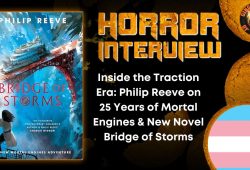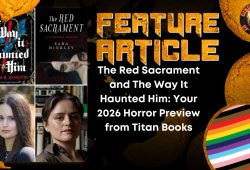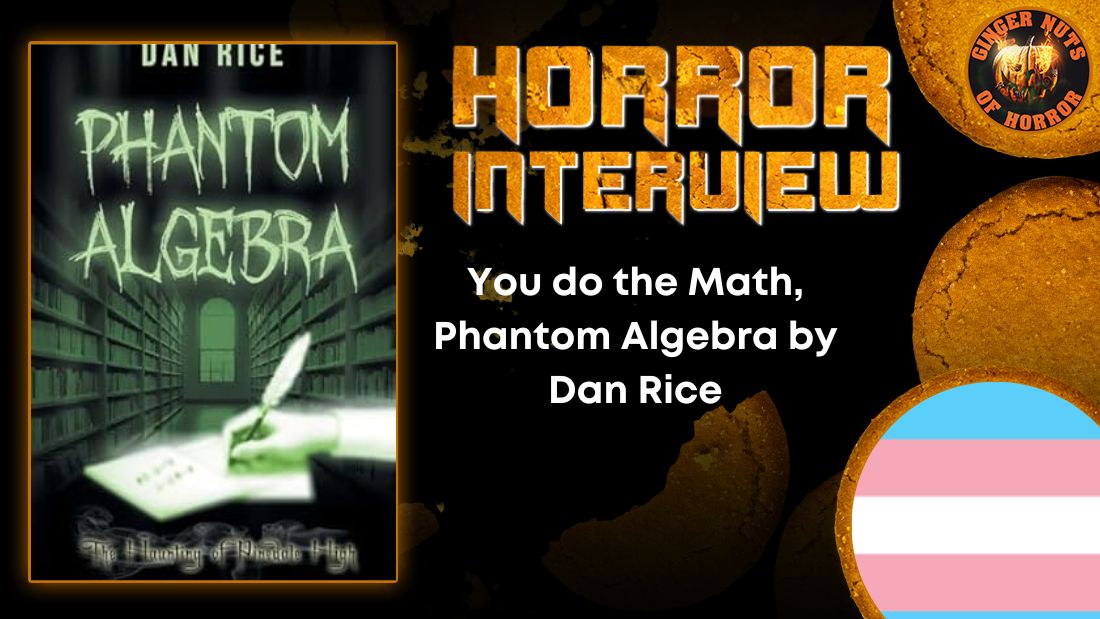Ever wonder who’s behind those spooky stories that keep you up at night? Meet Dan Rice. He’s not some mysterious figure lurking in a candlelit study; he’s a dad who wrestles words onto the page in the quiet, pre-dawn hours before his two sons wake up and turn the house into a joyful whirlwind. When he’s not writing or at his day job, you’ll likely find him on the sidelines of a soccer field or hiking a misty trail in the Pacific Northwest.
In this conversation, Dan opens up with refreshing honesty. He talks about the characters that even he would cross the street to avoid, shares the simple joy of getting a great book review, and reveals the one horror cliché he wishes would vanish for good. He’s the first to admit his own early struggles with writing, proving that even the authors who give us chills had to learn their craft one word at a time. So, grab a cup of coffee and get ready to dunk your Ginger Nuts into this interview.
You do the Math, Phantom Algebra by Dan Rice

Please tell the readers a little bit about yourself.
I’m Dan Rice. I write in the wee hours of the morning before my sons wake up to terrorize the household. When I’m not writing or working the day job, I’m often either taking my sons to soccer or hiking around the Pacific Northwest.
Which one of your characters would you least like to meet in real life?
Big Jake. If I had the misfortune to meet him, that would mean I owed his bosses money, and he was there to collect with interest.
Which of your characters is your favourite?
Zuri. I think she is the most interesting character I’ve written—a mixed martial artist who wants to solve everything with her fists, but discovers foes that she can’t punch in ghosts.
Which of your books best represents you?
Phantom Algebra because it is my best writing to date.
Other than the horror genre, what else has significantly influenced your writing?
Frank Herbert’s Dune had a profound influence on me from an early age. I was 11 or 12 the first time I read the novel. It was after that experience that I decided to try writing for myself.
The term horror, especially when applied to fiction, always has such heavy connotations. What’s your feeling on the term “horror”, and what do you think we can do to break past these assumptions?
Growing up, I always associated horror with gore. There’s nothing wrong with slasher spilling blood and guts, but some of the most terrifying reads out there have very little gore, or the gore is the least horrifying aspect of the tale. Two examples that come to mind are Swan Song by Robert McCammon and Holly by Stephen King.
Should horror be political?
Horror doesn’t have to be political, but that doesn’t mean it shouldn’t be political as long as the politics serve the story. Look at the history of the 20th century. Plenty of political leaders and their adherents have done horrifying things in the name of whatever ideology they embrace. There are certainly plenty of story germs that can be cultivated from history, which, with a bit of imagination, can easily be spun into a horror tale that includes politics and might even have a political bent.
Why do you think so many people enjoy horror?
I think it’s because people enjoy the little rush of adrenaline they get when being spooked while at the same time knowing that they’re perfectly safe.
What, if anything, is currently missing from the horror genre?
More truly terrifying female antagonists. About a year ago, I read Mine by Robert McCammon, which features a serial killer known as Mary Terror. She is one of the most frightening characters I have ever read and still gives me the heebie-jeebies.
What new and upcoming authors should we take notice of?
I really enjoyed Adam Cesare’s books since reading Clown in a Cornfield.
And who would be on your Mount Rushmore of horror?
Robert McCammon on the strength of Swan Song, which is one of my favorite books of all time.
Stephen King because he is truly the king of horror.
Stephen Graham Jones because The Only Good Indians is probably the creepiest book I’ve ever read. The Indian Lake Trilogy is damn good too.
Adam Cesare for the Clown in the Cornfield trilogy. Without reading those books, I probably wouldn’t have read any books in the horror genre at all.
Are there any reviews of your work, positive or negative, that have stayed with you?
Regarding Phantom Algebra, I’m very partial to a review I received from Midwest Book Review. It’s probably the best received by any of my books.
“Librarians can choose Phantom Algebra for their collections confident that the rich tone of emotional connection and discovery that opens the story will support the supernatural contentions and growing horror to deliver a one-two punch of surprises and revelations.”— D. Donovan, Sr. Reviewer, Midwest Book Review
What author doesn’t want to deliver a one-two punch surprises and revelations?
What aspects of writing do you find the most difficult?
The aspect of writing I struggled with the most is crafting compelling characters. I was the guy in the critique group who was constantly criticized for slipshod characterization, and rightfully so. Fortunately, I overcame this deficiency with practice and bullheaded persistence. The first book I managed to get published, Dragons Walk Among Us, was the first work I read to my critique group, which was consistently praised for the characterization.
Does writing energize or exhaust you?
Writing 100% energizes me. It gives me a reason to leap out of bed in the morning so I can get some words in before the family rises and the workday begins (or soccer dad duties on the weekend).
What’s your best advice for new authors about social media?
Social media can be a grind, but it is likely best to have a consistent presence on it as an author. You’ll notice many of the authors best at it seem to genuinely enjoy doing it. Try to find a way to engage with your potential audience on social media in a manner you enjoy, or at least don’t mind doing, and do it consistently.
How do you balance making demands on the reader with taking care of the reader?
For the kinds of stories I write, the key is to provide a satisfying emotional payoff in the end. As long as good triumphs over evil or the nasty bullies get their comeuppance, I think you can torture your characters, and in turn, your readers quite a bit. But if you cheat them out of a satisfying emotional payoff, you leave them wondering why they picked up your book in the first place.
Writing is not a static process; how have you developed as a writer?
The two aspects of my writing that have improved the most since I started are characterization and editing. For a long time, I struggled to create characters readers love or love to hate. That might be what I’m proudest of when it comes to writing—how far my characterization has come. Even Kirkus Review has given me kudos: “A sharp cast and absorbing monsters help this series entry to shine.”
As for editing, well, when I was starting out, I didn’t think I had anything worth taking the time to edit. That’s how bad the writing was. At the time, my critique group had a resident writer, a fellow with several best-selling pseudonyms, who told me I absolutely must edit my rough draft for the experience, if nothing else. I did a half-hearted edit job that didn’t improve the writing much. What I didn’t realize at the time is that it is during the editing process that the writing really comes alive.
What’s the most surprising thing you learned while writing your books?
When I first tried my hand at writing, I wanted to write gritty epic fantasy—think George RR Martin or Joe Abercrombie. I never imagined writing YA fiction or anything related to horror. Ultimately, you have to discover your authorial voice; you don’t get to choose it.
What does literary success look like to you?
The ultimate success is to be a huge New York Times bestseller so I can quit the day job and do the writing gig full-time. Until then, publishing consistently, having the sense my writing is continuously improving, and picking up a few readers along the way is literary success.
What is the best piece of advice you ever received regarding your writing?
In a general sense, the best advice is to read voraciously and write on a consistent basis. If you do just those two things, you might not be guaranteed to improve your writing, but more than likely you will.
Advice I heard at a talk given by popular science fiction author John Scalzi has probably helped me improve my writing the most. Scalzi advocated for writing short stories as writing assignments. Need to improve a particular aspect of characterization? Then write a short story delving into that and thoroughly exploring it. By treating the story as an assignment, you give yourself permission to experiment, and writing a short piece takes less time than banging out a novel. Following this advice accelerated my growth as a writer.
Do you have a favourite line or passage from your work, and would you like to share it with us?
I like to think this passage from Phantom Algebra is great.
As all good things must come to an end, so must all the horrors, even if what terrifies us seems to linger and linger and linger. Memory seeped and spurted into the consciousness. Recollection and abysmal purpose. The dark magic as black as any devilry wrought on the living world. The obsession. Spells woven over years. And the sacrifice.
Can you tell us about your last book, and can you tell us about what you are working on next?
My latest is a YA horror called Phantom Algebra. It blends the grit of Fight Like a Girl with the paranormal frights of Goosebumps. Zuri Williams dreams of being a mixed martial arts fighter, and her first instinct is to problem-solve with her fists. When she attends a haunted high school in quaint Pinedale, North Carolina, she will discover that, just like gnarly algebraic equations, not all monsters can be dispatched with a high kick alone.
Currently, I’m finishing up a couple of projects that are in the editorial phase. After that, I plan to start a YA horror/thriller that is a collab with my 10-year-old son. He told me he wanted a book featuring vampire dragons. It’s still early days yet, but I envision the yarn being a cross between Swarm and The Last Kids on Earth.
If you could erase one horror cliché, what would be your choice?
If I had to choose one cliché as the most cringeworthy, it would be stupid characters making incredibly foolish decisions. These characters are easy to spot, and you know exactly what will happen to them. They are like the red shirts in the original Star Trek.
If your partner was going to leave you for another author, which author would you like them to end up with and why?
George RR Martin, because he is my favorite author of all time. When I first read A Game of Thrones, my mind was officially blown.
What’s the one question you wish you would get asked but never do? And what would be the answer?
What do you hope readers feel after finishing your book?
Overall, I hope they feel like they’ve been on an incredible, hair-raising adventure that has made them a wee bit more prepared to face the most terrible horror of all, the real world. Also, it would be a bonus if they enjoyed the tale enough to share it with all their friends, family, and acquaintances, recommending it as the must-read book they had just finished.
Phantom Algebra by Dan Rice
Zuri and her mother settle in Pinedale, North Carolina, to start over. For years, they ve been on the run from Zuri s father, a retired boxer and full-time gangland enforcer. In Pinedale, Zuri finds a gym where she can train in mixed martial arts to pursue her dream of becoming a champion fighter.
At Pinedale High, she discovers friends among the outcasts, academic challenges, and something unexpected ghosts. When Zuri encounters a tween phantom haunting the library, her life is turned upside down and inside out as she attempts to help the spirit. This incurs the wrath of devils, living and dead. Zuri will need her martial arts prowess, heart, and the aid of friends to protect everyone she loves.
Author Bio:
Dan Rice pens the young adult urban fantasy series The Allison Lee Chronicles and other speculative fiction, both short and long, in the wee hours of the morning. The Allison Lee Chronicles kicks off with his award-winning debut, Dragons Walk Among Us, which Kirkus Reviews calls, “An inspirational and socially relevant fantasy.” The series’ third installment is out now, and the fourth and final volume will be out in early 2026 with a bit of good fortune. His latest novel, Phantom Algebra, a YA horror, was released on September 15, 2025.
Phantom Algebra buy links:
Interviews on Ginger Nuts of Horror
If you’re a fan of horror literature and cinema, then you absolutely need to check out the horror interview section of Ginger Nuts of Horror.
Firstly, the interviews feature a diverse range of authors, filmmakers, and horror enthusiasts, allowing readers to gain a multifaceted understanding of the genre. Each interview is an opportunity to explore the creative processes, inspirations, and personal stories behind the minds that produce some of the most chilling and thought-provoking works in horror today. From seasoned veterans to up-and-coming talents, the variety of voices ensures that readers can find something that resonates with them.
Moreover, these interviews often delve into the nuances of what makes horror such a compelling genre. Contributors share their thoughts on the psychological aspects of fear, the societal influences on horror trends, and the ways in which horror reflects cultural anxieties. This deeper exploration not only enriches one’s appreciation for horror stories but also fosters discussions about broader themes, such as identity, morality, and existential dread.
The interviews frequently touch on practical advice and industry insights. Writers and creators often share the hurdles they faced in their careers, tips for aspiring horror writers, and the realities of getting published or produced. This wealth of knowledge is invaluable for anyone looking to navigate the sometimes challenging waters of the horror genre. Readers interested in breaking into horror writing or filmmaking will find a treasure trove of wisdom that could pave their path toward success.
Lastly, the community aspect of Ginger Nuts of Horror cannot be overlooked. Engaging with these interviews allows readers to feel connected to a larger community of horror enthusiasts. Comment sections and social media interactions often follow, enabling fans to discuss their thoughts and engage with both the interviewees and fellow readers.
In conclusion, the horror interview section of Ginger Nuts of Horror is an essential resource for anyone interested in the genre. It provides rich insights, guidance, and inspiration that can deepen one’s appreciation for horror while fostering a vibrant community among fans and creators alike. Don’t miss out on the chance to delve into the minds of your favorite horror creators!










